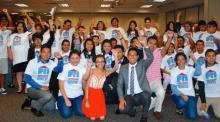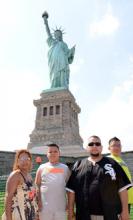#1in11million

Last week would have been the 71st birthday of my mother who was tragically killed abroad 15 years ago. Because of my undocumented status, I still have not been able to visit her grave site. This experience is all too common in the undocumented community. This is one of the many reasons why, despite the fact that I am an American by default, I struggle with my connection with this country and with the very concept of citizenship.
My mother brought me here legally when I was 9 in 1985 after fleeing our home country of Senegal following a painful estate dispute once my biological father passed away. She found work as a diplomat at the United Nations, and I came here as her dependent. I then attended high school at Georgetown Preparatory School in Washington, D.C., and thus switched to a student visa. I continued my education in Philadelphia at the University of Pennsylvania for two years but had to leave because I couldn’t afford the tuition. My mother was in Zimbabwe then and I couldn’t afford going to join her. Unfortunately, neither my diplomatic visa nor my student visa statuses count towards getting a Green card. When I left school, my status lapsed, and I became undocumented. Three years later, my mother was killed — a victim of domestic violence. With no “home country” to go back to and no way to adjust my status, I had to adjust myself to a life in the shadows.

"Whoever welcomes one such child in my name welcomes me, and whoever welcomes me welcomes not me but the one who sent me.” —Mark 9:37, NRSV
I was raised in a family with strong beliefs in our faith. It is because of my faith that I continue to strive for a better future and do good to others. This is why I’m so passionate for my advocacy in education, regardless of gender, race, and immigration status.
When I lived in Mexico, I thought about America every day. To me, America was a country of freedom, a country where every dream could come true. My grandparents waited 12 years to get their visas. The wait was agonizing; every year we faced poverty and struggle in Zacatecas. With every year, my dreams of a better life in America got farther and farther away. The feeling of hopelessness was overwhelming and pushed me to attempt suicide.
In that moment, I turned to faith. My family came to my aid and helped me through. Knowing how desperate for opportunity I had become, my parents reached out to my aunt in the United States. Together, they saved enough money to pay for my visa application. I finally had a chance at a life outside of our small family farm.
It was the summer of 2009 when I finally arrived in America. I was 16.

My sons, Issac and Felipe are my pride and joy. My wife and I go to church with them every Sunday, and we spend our free time at the movies or enjoying a walk through downtown Chicago. We also take road trips, one of which brought us to New York City where we visited the Statue of Liberty and Ellis Island.
I brought them there because I wanted them to see
the most important American monument in person. The Statue of Liberty is the icon of freedom and a historic welcoming signal to immigrants.
Chicago is my home. It's been that way for the past 17 years. I'm a maintenance worker at a residential building and a member of SEIU Local 1. I'm kind of living the American dream. I say "kind-of" because my undocumented status has prevented me from pursuing better job opportunities. I had the chance to become an assistant engineer at my building but declined the offer because I'm scared of losing the job if my bosses discover that I'm undocumented.

Earlier this week Jose Antonio Vargas, joined by ten other undocumented immigrants, announced the 1 of 11 Million campaign in Washington to urge the delay of deportations for the millions of documented immigrants in the United States. Vargas is founder of Define American, a national organization that uses stories to shift the narrative on immigration in America, and hopes to influence the executive action debate.
The campaign plans to tell the personal stories of 11 people who come from diverse backgrounds and whose experiences reflect many of the 11 million undocumented immigrants in this country. By providing a snapshot of our complex, outdated, and unpredictable system, advocates hope that changes announced by Obama will address the needs of communities nationwide.